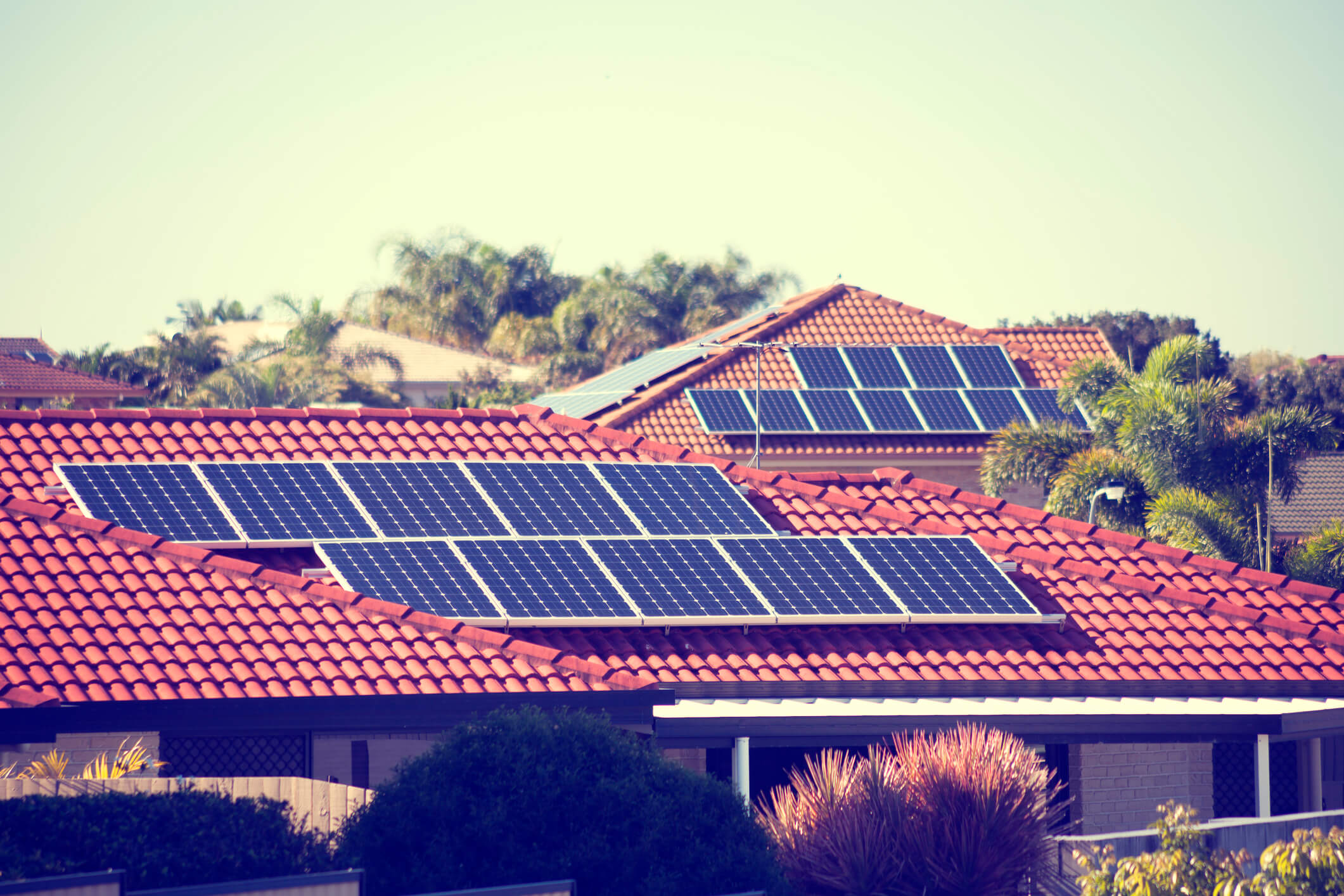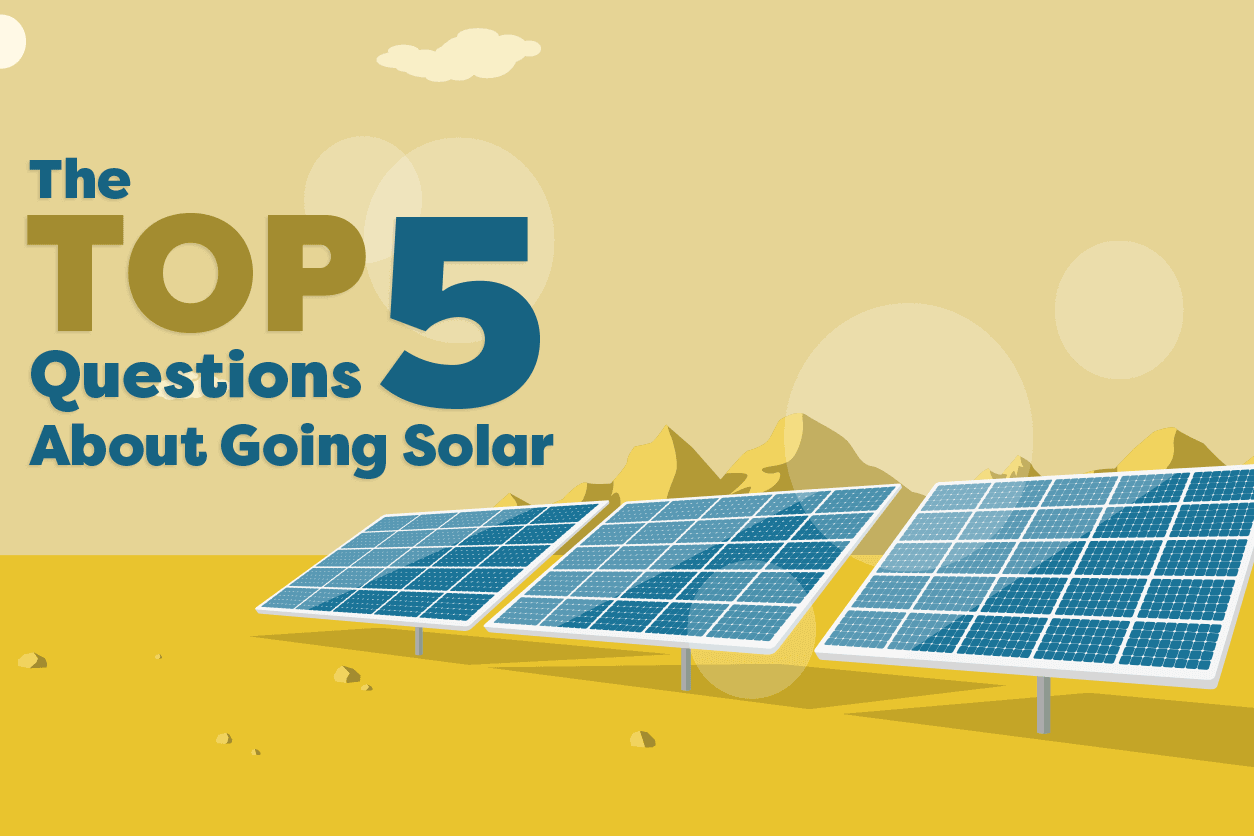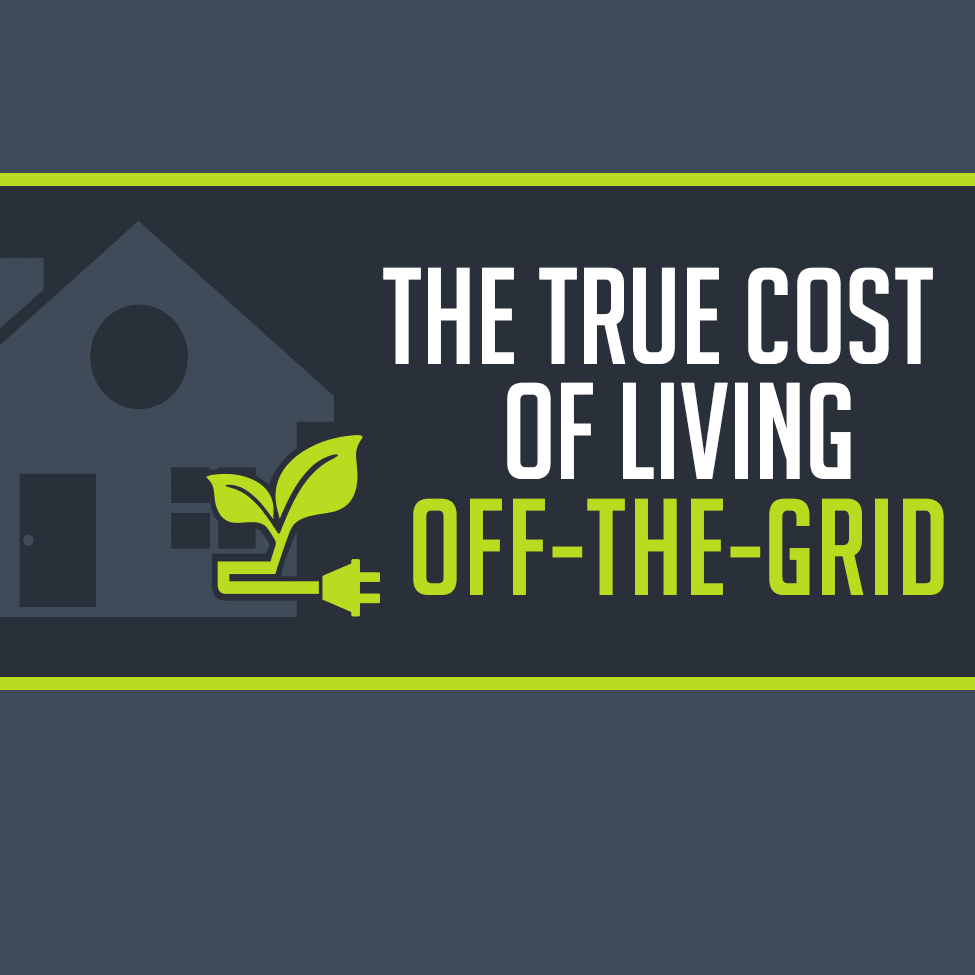SolarCity vs. SunRun: Which Company Outshines the Other?
Secured with SHA-256 Encryption




Table of Contents
Table of Contents


Head of Content
Meggan McCain, Head of Content, has been a professional writer and editor for over a decade. She leads the in-house content team at Quote.com. With three years dedicated to the insurance industry, Meggan combines her editorial expertise and passion for writing to help readers better understand complex insurance topics. As a content team manager, Meggan sets the tone for excellence by guiding co...
Meggan McCain


Sr. Director of Content
Sara Routhier, Senior Director of Content, has professional experience as an educator, SEO specialist, and content marketer. She has over 10 years of experience in the insurance industry. As a researcher, data nerd, writer, and editor, she strives to curate educational, enlightening articles that provide you with the must-know facts and best-kept secrets within the overwhelming world of insurance....
Sara Routhier


Commercial Lines Coverage Specialist
Michael Vereecke is the president of Customers First Insurance Group. He has been a licensed insurance agent for over 13 years. He also carries a Commercial Lines Coverage Specialist (CLCS) Designation, providing him the expertise to spot holes in businesses’ coverage. Since 2009, he has worked with many insurance providers, giving him unique insight into the insurance market, differences i...
Michael Vereecke
Updated July 2021
The solar industry in America is growing at a record pace.
When it comes to solar panels, business is booming with more and more companies clamoring for your business.
In fact, over 250,000 workers are employed by more than 9,000 solar companies in the U.S.
In the past ten years, the industry has grown at an average rate of 68% per year.
Although that seems like a lot, it’s tiny compared to China, where 2.5 million people work in the solar industry.
The top player in the solar industry today is SolarCity. They’re even more well-known today after being picked up by Elon Musk’s Tesla Corporation.
While not as dominant in the industry, SunRun is well known for being the first to set up solar leasing arrangements, where they own the equipment and the owner of the house only pays for the power supplied.
Each company has its pros and cons.
So, which one is right for you?
Home Design and Solar Service
You might not even be sure how solar power works.
Before you start researching solar companies, you should make sure your home or business is a good candidate for solar power. Believe it or not, not all homes are.
If one side of your roof faces south, you should be good.
As long as that side of your roof isn’t shaded too much, your house or business is perfect for solar panel installation.
Free Home Insurance Comparison
Compare Quotes From Top Companies and Save
Secured with SHA-256 Encryption
How Do You Get an Estimate for Solar Service?
You can can a quote from SunRun either on their website or over the phone. They ask you a couple basic questions to find out which service would be right for you.
They allow you to decide if you’d like them to maintain your system or if you’d like to keep up with the maintenance yourself.
They also help you decide whether you are right for leasing, buying, or Power Purchase Agreements (or PPAs).
SolarCity also offers a free quote through their website.
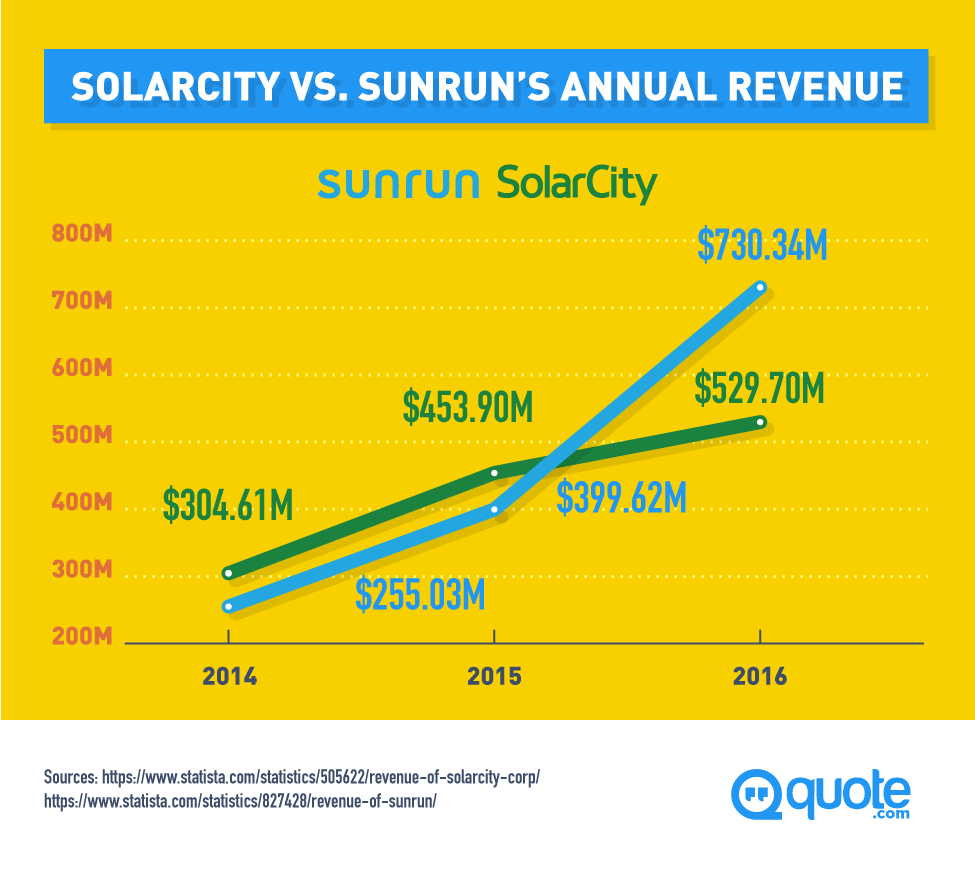
Based on your home’s architecture and your power needs, the quotes offer all financing and purchase options.
The Different Ways to Pay for Solar Service
There’s no question that solar panels are a good idea for many homes.
Research shows that, for a house with solar, the increased resale value is worth more than the cost to install it.
But financing options are key to making it work for you.
For both SolarCity and SunRun, there are three financing options. You can buy, you can lease, or you can enter into a PPA.
Buying is fairly straightforward. You purchase your equipment and pay for the install. Then you get the direct benefits of all the power that is generated. You pay for the full upfront cost of the system. You own it. The full value of the power that’s produced reduces your energy bill. Eventually, those savings will total more than what you paid up front. You can get a loan to finance a purchase. Both companies connect you with lenders if you’d like to purchase through a loan.
Leasing a solar power system is like leasing a car. You pay the company every month in return for using their equipment. Then the power that is produced reduces your monthly energy bill. For both companies, the term for a lease is 20 years.
PPA is just like leasing. Except instead of paying for the equipment, you pay the company for the power that’s produced. All of the costs are covered. That includes installation, monitoring, and maintenance. You lock in at a price for the energy that is produced. The main benefit is you save on what you would pay for regular power service. The price for electricity from the grid goes up over time, but your price stays the same. The rate that electricity prices increase is about 5% per year.
SunRun’s original goal was based on offering people leases or PPAs.
The objective was to make solar power available to everyone by making it cheaper.
Because customers bought the power, but not the equipment, the cost was much less.
They install, maintain, monitor and repair the systems. All you have to do is pay for the power.
Unless you have a lot of money to invest in a solar system up front, leasing or getting into a PPA is probably the best.
You don’t have to put any money up upfront.
And as time goes by and prices go up, you benefit more.
A cash purchase would be less expensive over the long term, but most people can’t afford that kind of capital investment.
On the other hand, there are lots of incentives out there for installing solar panels.
If you lease a solar system, the company benefits because they own it.
But if you own it yourself, you can take advantage of the rebates, refunds, tax credits and cash credits that are available.
SolarCity is currently focusing on selling solar systems to customers for cash or through financing.
According to the blog Solar Power World, the trend in solar financing is towards loans for purchases.
This is happening because the prices for the equipment are dropping, and more loan options are available. SolarCity is leading this trend.
Areas Served By Each Company
SolarCity services the District of Columbia and 20 states: Arizona, California, Colorado, Connecticut, Delaware, Hawaii, Maryland, Massachusetts, Nevada, New Hampshire, New Jersey, New Mexico, New York, Oregon, Pennsylvania, Rhode Island, Texas, Utah, Vermont, and Washington.
SunRun services 14 states: Arizona, California, Colorado, Connecticut, Hawaii, Massachusetts, Maryland, New Hampshire, Nevada, New Jersey, New York, Oregon, Pennsylvania and South Carolina. SunRun has also expanded recently to the Netherlands and Australia.
Free Home Insurance Comparison
Compare Quotes From Top Companies and Save
Secured with SHA-256 Encryption
Pros and Cons Of Each Solar Company
The blog Solar Industry uses the term “Solar Coaster” to describe the industry.
Considering the ups and downs companies in the sector experience, it’s not surprising that each company has its pros and cons.
SunRun was the first to create a business model where residential homes could lease solar panels. This removed the high upfront cost of purchasing.
They continue to be big players in the home solar industry. Now, in addition to the option of leasing, they offer other residential solar financing options. These include loans, purchasing, and PPAs. Their rates are locked in for 20 years.
SunRun also has other positives.
They partner with installers already working in your community, as a way to increase jobs in the areas they sell.
SunRun’s excellent monitoring and quick response from local companies is a definite pro. The company monitors your system 24 hours a day, 7 days a week, and they even give you a way to live monitor it, too.
In terms of SunRun’s cons, there are some complaints about poor customer service.
Contracting local installers was supposed to increase local support. But because SunRun doesn’t serve the customer directly, poor customer service complaints are plentiful.
On the technical side, with SunRun, there is no battery system to provide backup in the case of a power outage.
When they design your system, they use satellite imagery of your roof rather than coming to measure it in person.
Here’s a headscratcher: There have been some complaints that SunRun panels don’t produce as much as they were quoted.
But SunRun will make up the difference to meet what you were quoted. That makes it hard to complain!
SolarCity is the single biggest player in the American solar industry, with one-third of the market share in the United States. Unlike SunRun, their business model is all-inclusive.
They provide everything from financing to design, from getting your permits to the actual installation. They set you up with one team that takes care of it all.
Like SunRun, SolarCity’s financing options include PPAs, purchasing, loans, and leasing. They also have 24/7 monitoring and a mobile app that tracks system performance.
There are many advantages to working with SolarCity.
- They provide a battery backup for when the power goes out.
- The installers are their employees, not contractors.
- Their customer service is highly rated.
- They come in person to measure and evaluate your roof.
- Their own engineers design the system.
However, SolarCity has its cons.
Installation delays have been reported, and they don’t make up the difference if the panels fail to produce what was quoted.
Does the Type of Solar Panel Make a Difference?
SolarCity prides itself on the quality of its solar panels. According to their website, the panels they install last 10 years longer than typical panels – 35 years rather than 25 years.
SolarCity demands that their solar panels be 2 to 3 times better than industry standards.
The company performs audits and inspections of the factories where their products are made in order to make sure their high standards are being met.
They also perform regular tests to make sure their panels can stand extreme weather conditions.
The three brands that SolarCity oversees and installs are Sanyo, Kyocera, and Suntech.
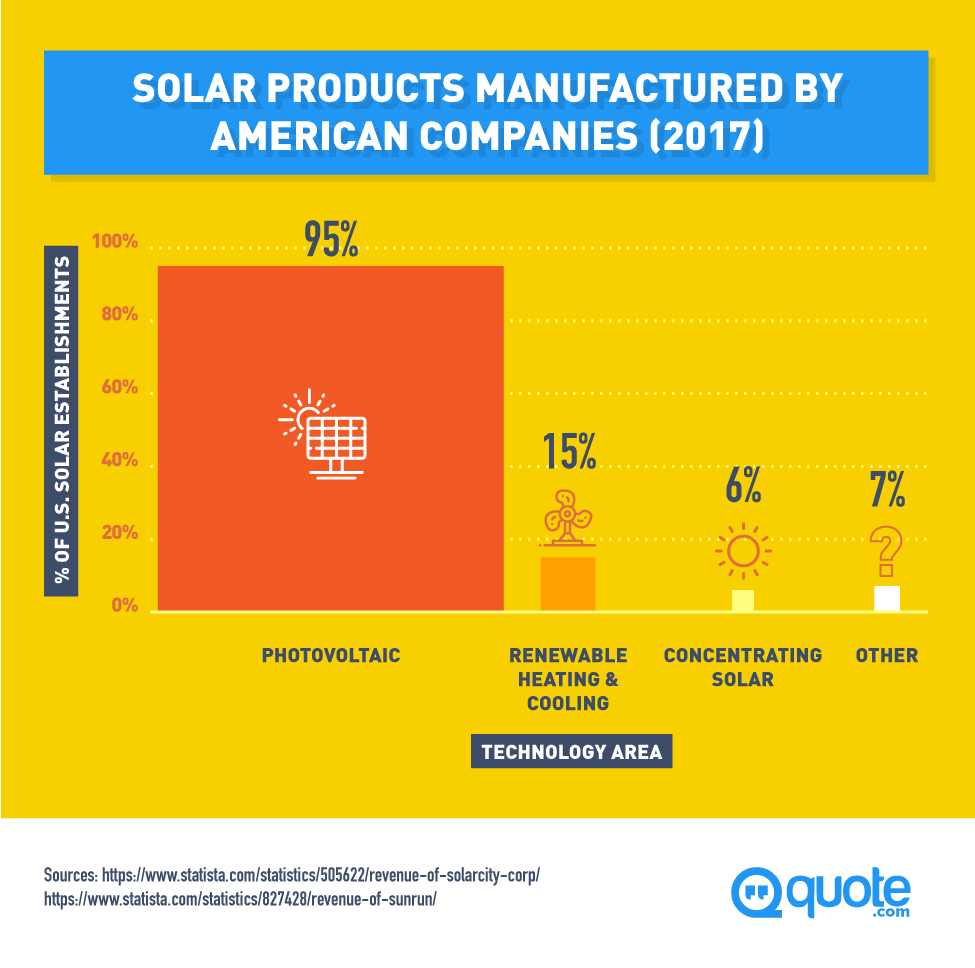
SunRun’s distribution arm lists over a dozen brands (including REC).
This is probably because they partner with local installers. The many panel brands are chosen by the many installation companies. They install a few different general types of panels.
The most efficient are monocrystalline panels. But they are also the most expensive.
Polysilicon panels cost less but are less efficient.
Thin film silicon panels take much more square footage on your rooftop to produce the same amount of power.
SunRun also offers Building Integrated Photovoltaics (BIPV). These look just like roof shingles but they are actually thin film solar panels.
Recently SolarCity released their Solar Roof shingles.
These are made out of glass and look like regular roof shingles – half as heavy as a regular roof tile and 3 times as strong!
How should this factor into your decision?
Well, SolarCity oversees the production of the panels they install, so they are able to control the quality. They know their panels are among the best out there.
SunRun, on the other hand, doesn’t control the production of their panels. The local installers they hire choose many different off-the-shelf panels.
Although these might meet the industry standards, SolarCity beats those by double or triple.
The fact that SolarCity’s panels perform for ten years longer than normal panels says a lot.
It costs a lot of money to set up a solar system; so if you can get one that lasts ten years longer, that is a major plus.
What Do The Customers Think?
The main complaint you see on customer reviews of SolarCity have nothing to do with their products – they can be unhappy with their customer service and their installations. Installations can be delayed, and it can be difficult to get in touch with them for customer service.
But, customers seem to like SolarCity’s contracts.
They can include options to cover costs of moving the system if the customer changes location. Also included are things like roof repair.
The different payment options they provide are also appreciated.
SunRun customers don’t appreciate it when they outsource their installers – it leads to inconsistency.
This inconsistency hampers the customer experience and increases concerns about quality. One thing SunRun customers like is their warranties for panels and roofs and the 20-year maintenance coverage options.
Free Home Insurance Comparison
Compare Quotes From Top Companies and Save
Secured with SHA-256 Encryption
How Much Do These Solar Panels Cost?
According to the company, the average cost to install a SunRun residential solar power system is between $15,000 and $29,000:
- $15,000 would be for a 4kW system
- $29,000 would be for an average 8kW system
Thismeans that the price per watt is $3.75 for the 4kW system and $3.63 for the 8kW system. It’s calculated elsewhere to cost $4.11 per watt.
For leases and PPAs, there is no cost for installation with SunRun.
If you choose conventional systems, SolarCity’s solar panels will cost you around $3.18 per watt.
You have the option to pay in full up front, or you can opt for financing.
Their “My Power” financing plans are loans that are set at a fixed rate of 5% for 30 years.
The Tesla solar roof is being sold for $21.85 per square foot.
Keep in mind that in addition to getting a solar system you also get a roof.
On the other hand, you will probably also want to buy the PowerWall, which will raise your start-up costs by a lot.
SolarCity does not charge for installation of their products. Whether you are buying, leasing or getting a PPA, you do not pay to have the panels installed.
You also have to think about how long SolarCity panels last. They have a 30-year warranty and claim to last 35 years.
However, it can take a long time to get an installation from SolarCity. There are reported backlogs.
It could take you 6 months or longer to get SolarCity to install your system.
SunRun takes up to four months to install your solar panels. T
Benefits of Each Company
One of the biggest benefits of Solar City is that their products last much longer than others.
SunRun’s panels are under 10 to 20-year warranties.
SolarCity’s are guaranteed for 30 years.
That’s a pretty big difference.
Investing in panels that are going to perform for ten years longer is a big benefit.
SolarCity also controls its entire supply chain.
They oversee solar panel production, take care of financing in-house, and installations are done by their employees.
This means they can make sure the quality is always top notch as well as the service.
SunRun is best known for its financing options and PPAs.
They are the leaders in providing leases and PPAs for homeowners, but they don’t have consistency when it comes to installers and the products they sell.
So much is dependant on the installer they contract and that can be risky.
Recommendation: Who Should You Pick?
Comparing these benefits, if you are looking to lease or set up a PPA, then SunRun is a great option for you.
If you are looking to buy a system, then SolarCity is for you… especially considering how much longer the panels last.
If you’re looking for the company that is most consistent and most reliable with its products and services, it is still SolarCity.
Have you gone solar with either of these companies?
What’s been your experience so far?
Let us know in the comments below!
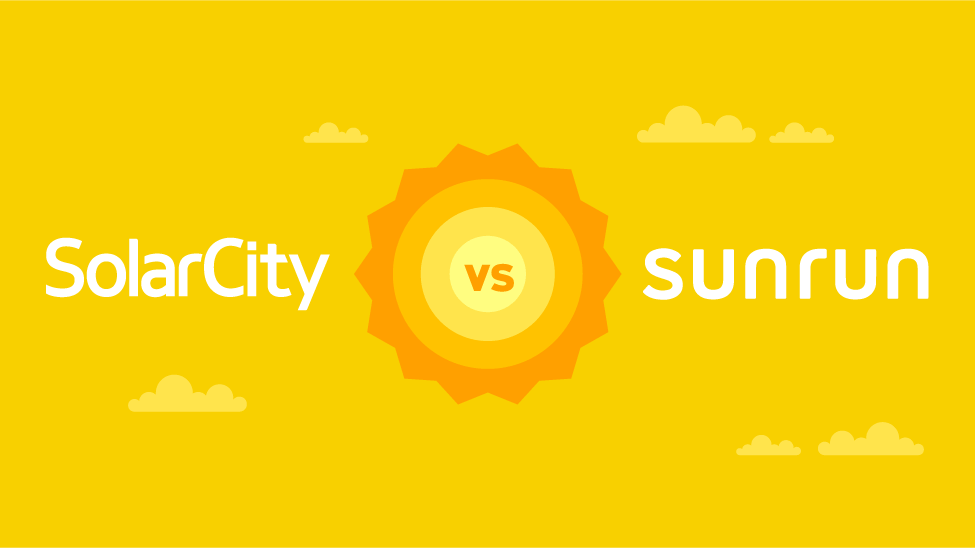
Get a FREE Quote in Minutes
Insurance rates change constantly — we help you stay ahead by making it easy to compare top options and save.
